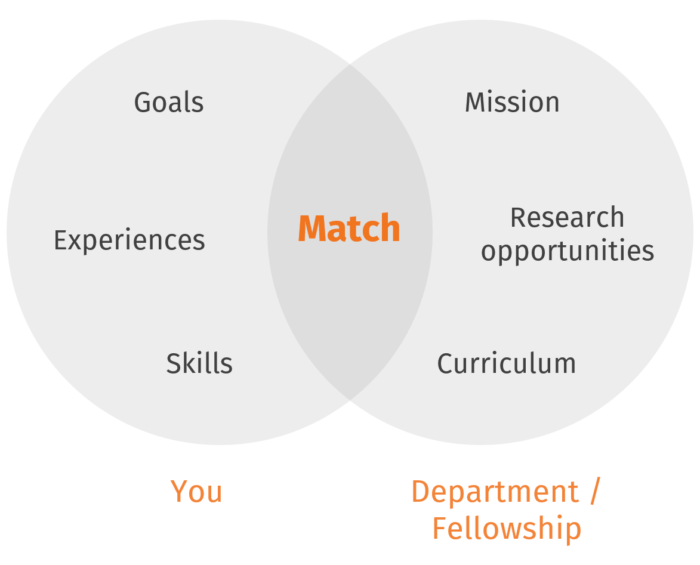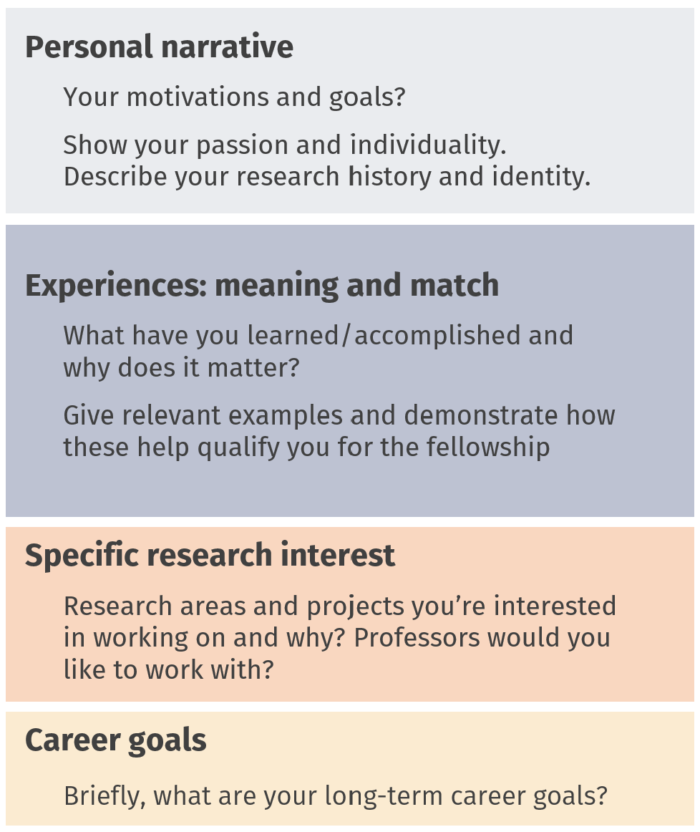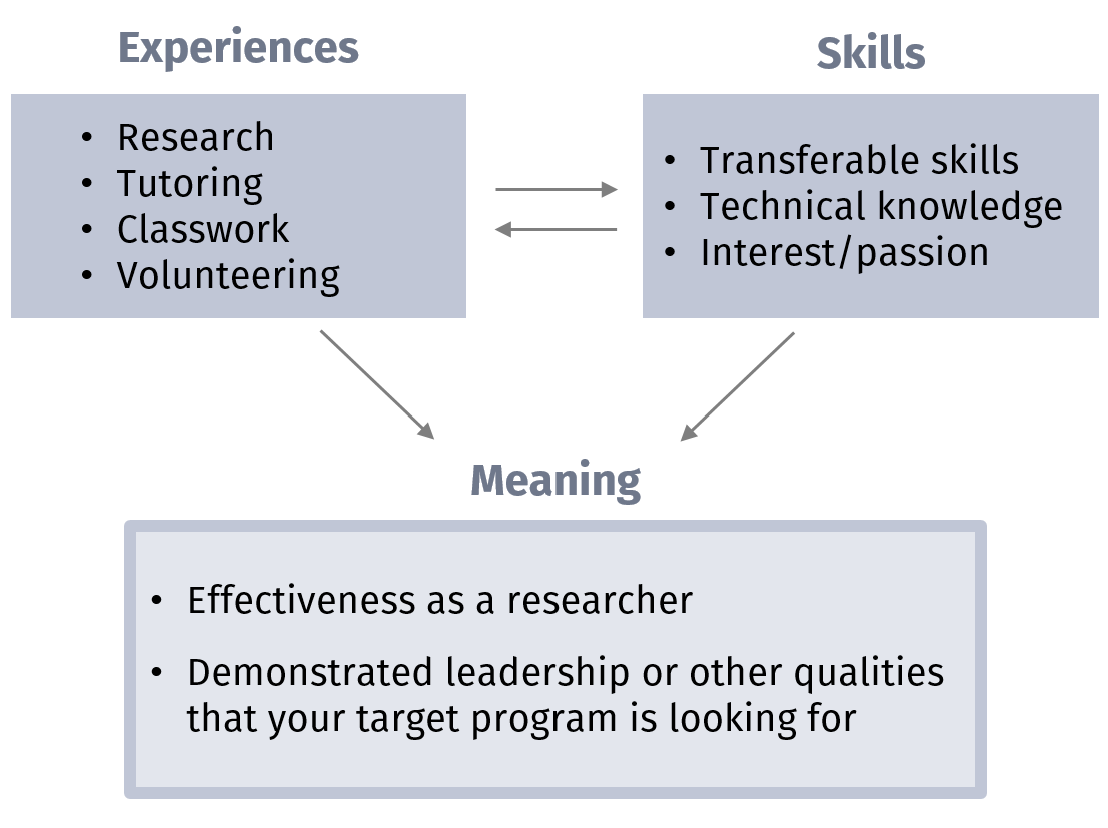
The graduate school personal statement is your chance to show the graduate committee what it would be like to have you in the department. Would you contribute positively to the program, work well with others, and have the necessary skills to undertake important research? Convince them you are worth the investment and that you’re a good match for their program through a compelling story that’s based on your concrete experiences.
If you are in a hurry, you can also check out this short video for quick tips.
| Contents |
| 1. Before you start 1.1. Reflect on your experiences and goals 1.2. Do your research on your target program 1.3. Consider your audience 2. Structure of a personal statement 2.1. A personal narrative 2.2. Your experiences 2.3. Specific research interest 2.4. Career goals 3. Maximize effectiveness 3.1. Use concrete examples 3.2. Explain the meaning of your experiences 4. Quick tips 5. Annotated examples |

Most applications are rejected if they look generic or the applicant appears uninformed about the target program. Your strategy will be to demonstrate that you have the skills, knowledge, and background necessary to succeed in this particular department and that this program aligns with your goals. In other words, show that you are a qualified match.
Reflect on your experience, motivation, and research goals. What drives your research motivations, and how do your motivations link to your background and long-term goals?
Think beyond the technical space when brainstorming ideas for your personal statement. What do you care about and value—besides getting a higher-level degree? Include experiences that demonstrate your leadership, organization, and communication skills as well. Whether it’s growing up on a farm, mentoring high school students, or leading a robotics team, these experiences can be used to demonstrate motivation, commitment, and a good work ethic. These are attributes that can help you be successful in a research lab.
To demonstrate how well you fit with the program, you must know what they value and what they are working toward. Each department has different goals and missions; some might value fundamental science, others engineering innovation, and others societal impact. Here are initial steps to take while researching a graduate program:

A graduate committee will review your application and determine if you would make a successful graduate student in the department. Although the determination varies from committee to committee, the reviewers will be looking for the following criteria, which you should specifically address in your statement:
A graduate committee is usually composed of faculty from the program of interest—and may be the same people who will spend years working with you if you’re accepted. They more than likely have the following:
If applying to MIT’s Nuclear Science and Engineering department, you can assume your audience knows what a tokamak is, but you cannot expect (all of) them to know every component. Likewise, you need not list all of your courses but could emphasize one or two advanced subjects if they are relevant to your past and intended future research.

As long as you stay within the specifications set by your target program, you have the freedom to structure your personal statement as you wish. Still, you can use the structure shown on the right as a loose guide for demonstrating match.
Build a personal narrative that ties together your personal history, experiences, and motivations. In addition to a few paragraphs (2-3) at the beginning of your statement, you can weave your motivation and goals throughout your document to create a cohesive story. This cements your identity into the minds of the graduate committee. If they remember you, they will be more likely to accept you!
When crafting a personal narrative, consider the following:
Keep these questions in mind as you are writing other sections of your personal statement.
This section is typically 2-4 paragraphs long, with examples to illustrate your point. To decide which experiences to share, ask yourself these two questions: In which ways did this experience help me grow? Why should the review committee care? One common mistake is to describe an experience in great detail and then fail to translate it into relevant strengths that the committee would care about. Therefore, explicitly say what that experience means for your future goals, including your work as a graduate student.
Spend 1-2 paragraphs describing your research goals. Briefly summarize the projects you want to work on (and professors you’d like to work with, if applicable), and how those fit in with your experiences. Describe how your past experiences have prepared you for working on this new project in graduate school. If you’re already in graduate school, you can spend more time on this section, as it is also a part of your past experiences.
Finally, your long-term career goals should be a logical completion of the personal narrative you’ve built throughout the document, and usually takes up one paragraph. How will this graduate program fit into your future career? How will graduate school in general allow you to pursue these goals? Because your personal statement should show that you are a qualified match, describe how your goals overlap with those of the department or program. Your readers will not hold you to these goals, but they will see you are forward-thinking and have ambitions.
Make your relevant experiences tangible by stating specific outcomes such as awards, discoveries, and publications. Whenever possible, try to quantify the experience. How many people were on your team? How many protocols did you develop? As a TA, how often did you meet with your students? Here are some examples of vague and concrete experiences:
| Vague experience (less effective) | Concrete experience (more effective) |
| My mind was opened to the possibility of using different programming languages together to create code that is faster to run and easier to understand and modify. | During this project, I collaborated with other group members to develop a user-friendly Python wrapper for a 10,000-line Fortran library. |
| I won the physic department’s Laser Focus prize. | I won the physics department’s prize for the top student in my cohort of 20 students. |
| I learned about how particle accelerators work. | I took apart and repaired two electromagnetic steering filters inside of a particle accelerator. |

Your goal in sharing your experiences is to demonstrate that you have the qualifications, qualities, and drive needed to succeed in graduate school. Therefore, you will need to not only choose experiences wisely but also state specifically what they mean within the context of your application.
Even if it feels obvious to you, you need to explicitly answer these questions to your audience. Here are some examples experiences that have been expanded to contain meaning:
| Experience only (less effective) | Experience and Meaning (more effective) |
| “As a senior, I received an A in a graduate-level CFD course.” | “My advanced coursework demonstrates my ability to thrive in a challenging academic environment. A graduate-level computational fluid dynamics course challenged me to…” |
| “I independently developed a digital data acquisition software for gamma spectroscopy.” | “My research experiences have developed my problem-solving abilities. When the commercial software was insufficient for my gamma spectroscopy project, I … This has given me the confidence and software skills to attack open-ended research problems.” |
Here are examples of graduate school personal statements from students who have been accepted into MIT NSE. Note that prompts vary from program to program, and sometimes from year to year within the same department. Be sure to follow the prompt for your program and your application cycle.
To get started or receive feedback on your graduate school personal statement, make an appointment with one of us. We would love to help you!
Whether you wanted to go to grad school all your life or decided last week, all your experiences, goals, and motivations brought you to this point. Think about how they influenced you up until now and how they will drive you in the future.
Monica Pham
NSE Communication Fellow 2020-2021
View Profile
NSE students and postdocs: Want to talk with us about your project?
NSE Communication Lab: Room 24-216
nse-commlab@mit.edu
+1-617-253-3808
CommKit Content is licensed under the Creative Commons Attribution Non-Commercial License 4.0 unless otherwise noted.